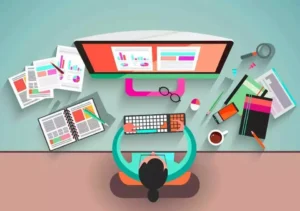INTRODUCTION
The roles of web designers and web developers are treated synonymously. Having a great online profile for your businesses or as individuals is necessary to get an audience and identify yourself in this quickly developing globe.
The contemporary business environment requires certain special features and exclusive attributes that can differentiate these entities from each other, thus ensuring growth. Developing a stylish and functional website is a significant part of this digital strategy. 80% of people spend much of their time on the Internet, so the necessity for a focused and effective online presence is hard to underestimate. A well-designed website becomes a digital shop and becomes an interactive and communicative platform.
While the traditional method has been to hire skilled designers and developers, times are changing. These individuals come with unique skills, roles, and responsibilities, so it’s a need for careful consideration as to whether hiring a designer or developer is best.
This decision-making concept is reduced to the balance of design and functionality when thinking about how businesses or individuals create a digital space attractive enough for an audience that has grown very sophisticated by being online all day. The issue of whether to engage a designer or a developer at what point determines the quality and level of success that business people have when venturing online during this dynamic but competitive digital age.
Understanding the Distinction: Web Designer vs. Web Developer
Such roles as designers and developers are sometimes treated synonymously; however, their activities and skills are different. These distinctions are significant for a complete understanding when one plans to develop websites.
- Web Designer:
A designer mainly deals with the designs of a website. This involves creating a visually appealing UI and guaranteeing good UX. Some of the essential duties of a designer include color scheme selection, graphic designing, typography choice and element size determination. A good designer should be proficient in creative tools like Photoshop and Illustrator. Their attention is primarily on front-end development, focusing more on how a website appears and feels to site users.
- Web Developer:
Conversely, a designer focuses more on the functionality and structure of a website. They get involved in the technical details of creating a website, working on the back end to ensure everything runs smoothly. A developer should possess advanced expertise in coding languages such as HTML, CSS, JavaScript, and PHP. They are also responsible for overseeing server-side operations and databases and ensuring the site works without glitches. Although designers are involved in the front-end part, there is a difference because developers also concentrate on what happens at the back end of website development.
The evolving digital landscape, however, introduces a nuanced consideration. With user-friendly tools and content management systems available, individuals and businesses now have the capability to design and develop websites independently. This shift prompts the question: Do you need to hire professionals, or can you navigate the digital terrain solo?
While smaller projects or those with limited resources might find value in an all-in-one approach or exploring DIY website creation platforms, larger endeavors often benefit from the specialized skills of both designers and developers. For enterprise-level websites seeking a sophisticated design, complex functionalities, and a strong user experience, the combined expertise of these professionals becomes a powerful asset.
The financial aspect also plays a pivotal role. Understanding the costs associated with hiring web designers and developers is essential for budgetary planning. Designers typically charge between $10 and $50 per hour, while web developers‘ rates range from $30 to $65 per hour. A basic website development cost from a medium-sized web crafting agency could be approximately $65-$100 per hour.
In essence, the decision to hire a designer or a developer, or both, boils down to the specific requirements of the project. Are you aiming for a visually appealing design that leaves a lasting impression, or do you prioritize intricate functionalities and seamless operations? A thoughtful analysis of project goals, coupled with a clear understanding of the strengths each role brings, ensures a strategic approach to navigating the dynamic landscape of web creation.
Navigating the Decision: When to Hire a Web Designer or Web Developer
However, whether to hire a designer or a developer is determined by several factors, such as the nature of the project, budget limitations and organizational goals. Here’s a concise guide to help navigate this decision-making process:
- Visual Appeal and User Experience:
Hiring a designer would be appropriate if the main objective is to build a visually attractive site where UI and UX are significant concerns. Their strength is creating things that appeal to the audience and improve general user interaction.
- Custom Features and Coding:
Only a developer will suffice for a project that needs special features, complex functionality, and complicated coding. On the other hand, developers provide technical know-how to ensure that a website works smoothly and efficiently.
- Budget and Resource Constraints:
For small businesses that are tight on resources, looking for someone who can handle both the design and development aspects of a website may be an ideal solution. Otherwise, employing versatile freelancers can bring flexibility.
- Brand Differentiation and Specialization:
Or larger companies that focus on brand differentiation may decide to recruit specialists for design and development as separate entities. It enables a more sophisticated strategy, with specialists to address each area, producing an original and powerful online presence.
Understanding the Costs: Web Designer vs. Web Developer
The financial aspect is one of the key elements that influence decision-making. Awareness of the common cost of hiring designers and developers can assist in budgetary planning. Here’s a general overview:
Web Designer:
- However, hourly rates typically fall between $10 and $50.
- Fees might differ according to experience, qualifications and complications of the design.
Web Developer:
- Hourly rates typically range from $30 to 65.
- Rates may differ owing to a developer’s proficiency, experience and coding needs.
Combined Cost:
- An essential website hire may cost between $65 to 100 per hour for both designer and developer from a medium-sized agency.
- For both roles, designing a site would cost around $6000 altogether.
Collaboration Dynamics: Web Designers and Developers Collaboration
There is a clear distinction between designers to ensure a harmonious and effective outcome, it is necessary to understand their collaborative dynamics.
- Architects and Builders Analogy:
A common analogy regards designers as architects and developers as builders. Web designers turn the ideas into something practical and tangible —the world’s architects online. On the other hand, web developers and containers realize that vision by providing all those technical elements to make it functional.
- Overlap and Interconnected Roles:
While web designers and developers are similar and familiar, they also focus on different primary areas. To create a well-rounded and successful web project, people on the team need to know each other’s points of view, as this will enable them to work together effectively..
Why Hire Both: Utilizing the Guidance of Web Designers and Web Developers
Hence, companies choose to hire professionals of both categories for the big-scale ones that need a professional design and intricate function performed along with an advanced user experience. Here are key reasons to consider hiring both:
- Highly Sophisticated Design:
Enterprise-level sites usually require a high degree of design complexity to differentiate them from competitors. Designers use their creative talent to ensure that what the eyes see matches well with how a brand is known and stays in the minds of customers.
- Complex Functionalities:
Web developer knowledge is required for projects with complex functionalities and custom features. This can create a solid back-end system to enable the necessary functions from uninterrupted user experience.
- Strong User Experience:
Web designers enhance user experience for UI and UX. Their skills, combined with the technical skills of web development developers, ensure a visually striking site that is intuitive and functional.
- Holistic Approach:
Both of these professionals are appointed to develop a website integrally. A unified process of collaboration between designers and developers from the planning to deployment stages produces excellent results in terms of a powerful online presence.
How to Hire a Web Designer and Web Developer: Best Practices
One must now decide whether to hire a web designer or both of these specialists and find capable people for any position. It is also involved in writing job descriptions and hunting for appropriate candidates while making sound decisions during recruitment. Here are the best practices for hiring web professionals:
- Determine Your Needs:
Clarify the aims of your project before you start hiring. Determine if design matters more than functionality or other factors, etc., so that you can determine the right professionals to approach.
- Craft Detailed Job Descriptions:
Write comprehensive job descriptions according to your project requirements. Define what skills, experience and Expertise are needed in a web designer or Web Developer. The specificity of job vacancy descriptions attracts the relevant candidates.
- Freelance or Full-Time Consideration:
Decide whether to hire freelancers or permanent staff. Freelancers are mobile and ideal for temporary or unique projects, but permanent staff members may support larger projects over a long period.
- Evaluate Expertise:
Ensure that the people you hire possess skills and experience proportional to your project needs. Review previous projects and experiences based on positive outcomes. Use an interview to see how clearly they understand your intentions and can help you achieve them correctly.
- Collaboration and Communication Skills:
This web design and development process is collaborative; therefore, choosing candidates with good collaboration skills is a significant preference. Good rapport among team members is essential for a smooth workflow and success in the project.
- Define Project Scope and Timeline:
You need to spell out the scope of your project and how long it should take. This information is pertinent to you and the candidates as it helps ensure that both of your thoughts are consistent on what a project should entail, how long it ought to take, and when upon completion.
- Assess Technical Proficiency:
Ask web developers to assess their capacities with necessary coding languages and technology platforms. For web designers, check their knowledge of creativity tools and design rules.
- Check References:
The candidates provide these references to determine their work ethic, reliability and quality of delivery. Overall, past results are good indicators of future success.
- Communicate Project Details:
When recruiting, be as informative to potential candidates about your project as possible. Your brand identity, target audience, particular design preferences and technical requirements. So, with proper communication, prospects can determine if they can meet your expectations.
- Assess Problem-Solving Skills:
You should, therefore, ask them what their problem-solving strategy is, how they handle a particular situation and if
- Cultural Fit:
Focus on the cultural compatibility of potential candidates in your company. A positive and synergistic dynamic in a team makes work more productive and enjoyable.
Conclusion
Thus, the responsibilities of designers and developers are similar but separate in making a successful website. Although modern technological progress allows everyone to create their websites without any difficulties, it is still rather crucial whether or not one should employ a professional for this purpose if they decide to obtain custom design and other technical requirements.
Once the requirements of a project are set, it is essential to choose between hiring a web designer or a developer. It is important to note that while designers try their best to produce visually appealing designs and enhance the user experience, a developer adds the technical knowledge required for any product to work well. Hire both professionals to look at the project’s development from an overall perspective, especially for large-scale projects requiring intricate design, advanced functionalities, and a higher user interface.
Financial is also one of the main components where designers and developers and complexity costs may vary depending on their experience. There are collaborative relationships among designers and developers that facilitate a well-structured problem.
Before the involvement of people in projects, it is essential to ascertain what a project needs, come up with qualitative descriptions for positions and understand candidates’ knowledge adequately. To hire freelancers or full-time professionals – verify technical skills, problem-solving ability and cultural fit to make an informed hiring decision.
In the fast-changing digital environment, a partnership between designers and developers still matters most because they build practical and user-oriented online environments. One can navigate this landscape with a refined consciousness of roles, needs and rules. Thus, it meets more than user expectations in a world that is becoming somewhat competitive online.


